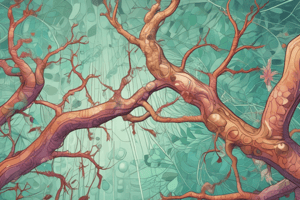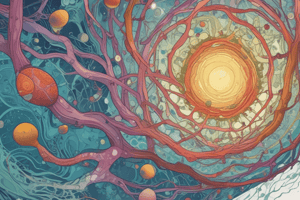Podcast
Questions and Answers
What is the primary function of photosynthesis in plants?
What is the primary function of photosynthesis in plants?
- To synthesize foods from carbon dioxide and water. (correct)
- To break down glucose for energy.
- To synthesize proteins from amino acids.
- To replicate DNA.
Which level of biological organization comes after tissues?
Which level of biological organization comes after tissues?
- Organ Systems
- Organs (correct)
- Populations
- Cells
Which process is directly responsible for the release of energy from glucose?
Which process is directly responsible for the release of energy from glucose?
- Photosynthesis (correct)
- Cellular Respiration (correct)
- DNA Replication
- Gene Expression
What role does gene expression play in biology?
What role does gene expression play in biology?
Why is understanding biology important for human society?
Why is understanding biology important for human society?
Which branch of biology focuses primarily on plant life?
Which branch of biology focuses primarily on plant life?
What term refers to the ability of an organism to maintain a stable internal environment?
What term refers to the ability of an organism to maintain a stable internal environment?
Which concept is defined as the gradual change in the inherited traits of biological populations over generations?
Which concept is defined as the gradual change in the inherited traits of biological populations over generations?
Which branch of biology would most likely study the interactions of organisms within their environment?
Which branch of biology would most likely study the interactions of organisms within their environment?
What do we call the basic unit of life, as stated in cell theory?
What do we call the basic unit of life, as stated in cell theory?
Which branch of biology focuses on the study of heredity and genetic variation?
Which branch of biology focuses on the study of heredity and genetic variation?
What does metabolism refer to in the context of living organisms?
What does metabolism refer to in the context of living organisms?
Which concept describes how organisms become better suited to their environment over time?
Which concept describes how organisms become better suited to their environment over time?
Flashcards
Photosynthesis
Photosynthesis
The process by which plants and some other organisms use sunlight to synthesize foods from carbon dioxide and water.
Cellular Respiration
Cellular Respiration
The process by which cells break down glucose and other organic molecules to release energy.
Tissues
Tissues
Groups of similar cells working together.
DNA Replication
DNA Replication
Signup and view all the flashcards
Gene Expression
Gene Expression
Signup and view all the flashcards
What is biology?
What is biology?
Signup and view all the flashcards
What is zoology?
What is zoology?
Signup and view all the flashcards
What is botany?
What is botany?
Signup and view all the flashcards
What is microbiology?
What is microbiology?
Signup and view all the flashcards
What is homeostasis?
What is homeostasis?
Signup and view all the flashcards
What is metabolism?
What is metabolism?
Signup and view all the flashcards
What is reproduction?
What is reproduction?
Signup and view all the flashcards
What is evolution?
What is evolution?
Signup and view all the flashcards
Study Notes
Introduction to Biology
- Biology is the scientific study of life and living organisms, encompassing a broad field of study.
- It explores the structure, function, growth, origin, evolution, distribution, and taxonomy of all living things.
- The discipline covers various levels of biological organization, from atoms to ecosystems.
Branches of Biology
- Zoology: Focuses on animal life, including their anatomy, physiology, behavior, evolution, and classification.
- Botany: Studies plants, including their structure, growth, reproduction, and interactions with the environment.
- Microbiology: Examines microscopic organisms, such as bacteria, viruses, fungi, and protozoa.
- Ecology: Studies the interactions between organisms and their environment, including populations, communities, and ecosystems.
- Genetics: Explores heredity and the mechanisms of inheritance, including genes, DNA, and genetic variation.
- Physiology: Investigates the functions of living organisms at different levels, from cells and tissues to organ systems.
- Molecular Biology: Examines biological processes at the molecular level, including the structure and function of macromolecules, like proteins and nucleic acids.
- Evolutionary Biology: Focuses on the processes that have led to the diversity of life on Earth.
- Biochemistry: Studies the chemical processes that occur within living organisms.
- Cell Biology: Investigates the structure and function of cells, the basic units of life.
Key Biological Concepts
- Cell Theory: All living organisms are composed of one or more cells; the cell is the basic unit of life; and all cells arise from pre-existing cells.
- Homeostasis: The ability of an organism to maintain a stable internal environment in response to changes in the external environment.
- Metabolism: The sum of all chemical reactions that occur within a living organism, including anabolism (building up molecules) and catabolism (breaking down molecules).
- Reproduction: The process by which organisms produce offspring, ensuring the continuity of their species.
- Evolution: The gradual change in the inherited traits of biological populations over successive generations.
- Adaptation: The process by which organisms become better suited to their environment over time.
Fundamental Biological Processes
- Photosynthesis: The process by which plants and some other organisms use sunlight to synthesize foods from carbon dioxide and water.
- Cellular Respiration: The process by which cells break down glucose and other organic molecules to release energy.
- DNA Replication: The process by which DNA makes a copy of itself.
- Protein Synthesis: The process by which cells synthesize proteins from amino acids.
- Gene Expression: The process by which information from a gene is used in the synthesis of a functional gene product.
- Nucleotide Synthesis: Synthesis of nucleosides and nucleotides.
Levels of Biological Organization
- Atoms: The fundamental building blocks of matter.
- Molecules: Combinations of atoms.
- Cells: The basic unit of life.
- Tissues: Groups of similar cells working together.
- Organs: Structures composed of different tissues working together.
- Organ Systems: Groups of organs working together.
- Organisms: Individual living beings.
- Populations: Groups of individuals of the same species living in the same area.
- Communities: Groups of different populations interacting in the same area.
- Ecosystems: All living organisms and their physical environment.
Importance of Biology
- Understanding biology is vital for addressing global challenges like disease, food security, and environmental sustainability.
- Biology provides a framework for comprehending the natural world and our place within it.
- It leads to advancements in medicine, agriculture, and technology.
Studying That Suits You
Use AI to generate personalized quizzes and flashcards to suit your learning preferences.




